Stories from the Road: Felicia Burke’s acre-by-acre advocacy for Georgia’s rural Black farmers
July 8, 2025
Story by Cowgirl Candace | Photos by Vintrez Davis
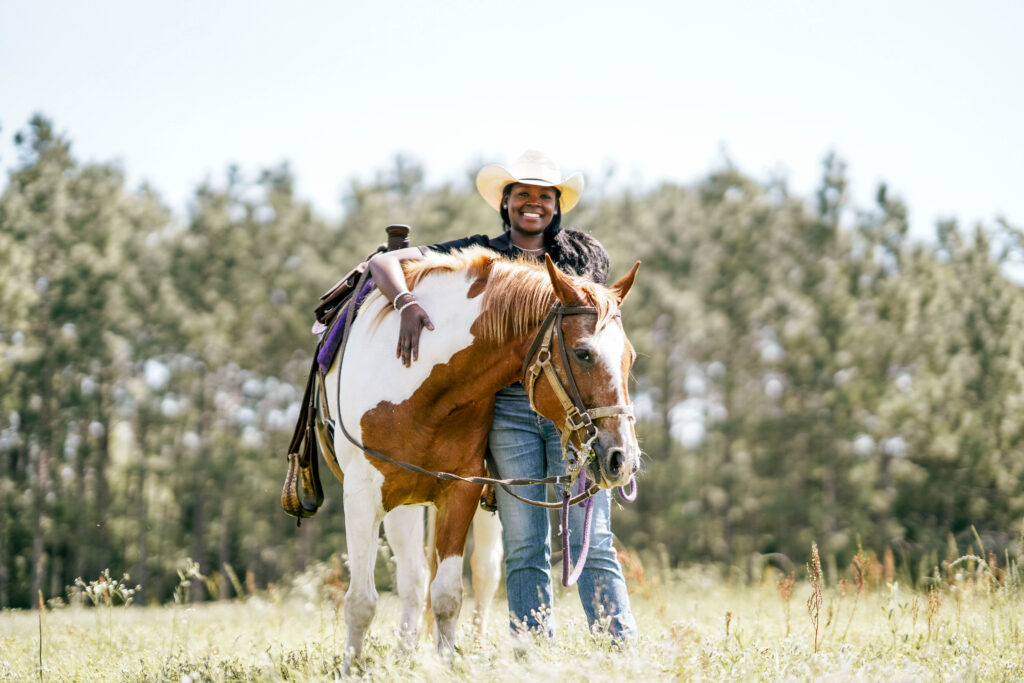
Her black Ford F-150 rumbles to life before the sun climbs over the pecan trees. I watch Felicia Burke adjust her cowgirl hat in the rearview mirror then plug a rural Georgia address into her GPS. It’s a ritual she repeats monthly, even weekly. Daybreaking with purpose to bring farmers and their futures closer together. “I come from agricultural roots,” she tells me, dimples appearing beneath the brim of her hat. “See me as the connection between farmers and future resources so they can thrive in their market — from online marketplaces to farm-to-table partnerships to community-supported agriculture.”
Felicia hails from Fort Valley, Georgia — the “Peach Capital of the World.” But her reach and roots stretch far beyond peach orchards. As the agriculture program manager at the Southwest Georgia Project for Community Education for the past four years, she walks fencerows and across more than 200 farms in 14 counties. Her boots kick up red clay as she listens to stories of perseverance and of land held tight through generations despite systemic barriers. “We’re moving the needle,” she tells me with that steady conviction, “in technical assistance, regenerative farming education, and access to programs that help farmers digitize operations and develop agritourism initiatives to sustain their land.”
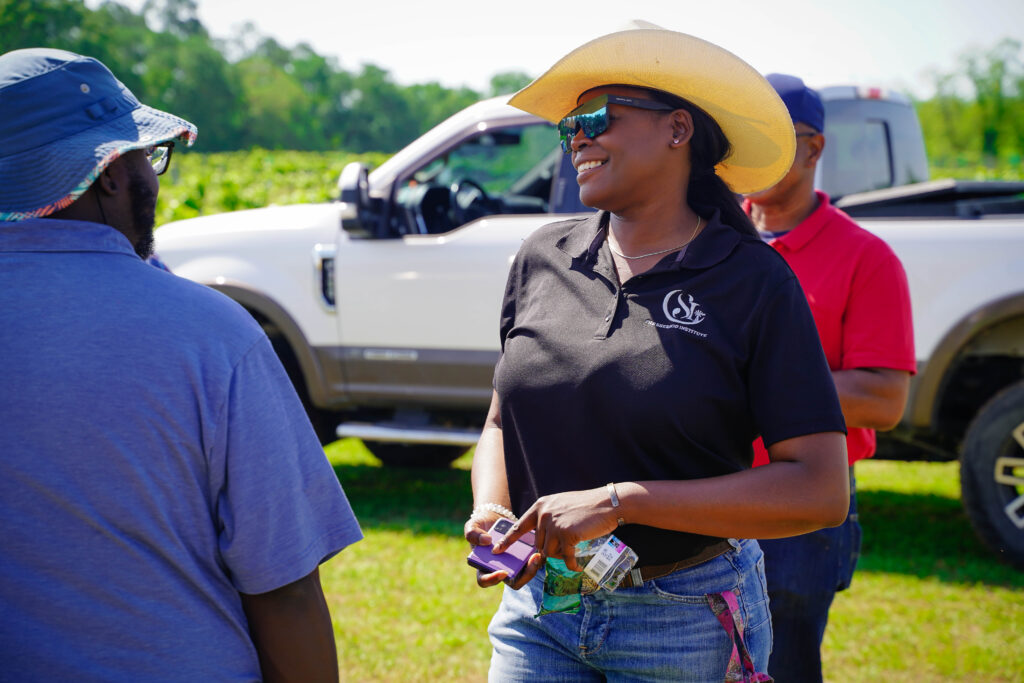
Felicia doesn’t walk this path alone. She does so on behalf of The Sherrod Institute’s Southwest Georgia Project, in which Shirley Sherrod — a former USDA official — serves as its executive director. A vision born out of the Civil Rights Movement by Shirley and her late husband, Rev. Charles Sherrod. The Sherrod Institute’s team turns porches into planning tables. Hayfields into outdoor classrooms. Their gatherings (under a shade tree or at a state university) carry weight, responsibility, and renewal.
Black farmers today make up less than 2 percent of all U.S. producers. In Georgia, their average age is 65. The numbers are sobering. But Felicia sees something else: possibility. She leads college outreach at HBCUs, curates farm tours on Black-owned land, and offers conservation and digital-farming workshops that remind landowners that our history in the Deep South runs deep. “A lot of folks forget we’ve always been here,” she says. “Black folks are farmers, caretakers, cattlemen, gardeners, and especially land stewards. We have been long before there were celebrity billboards or major brands.”
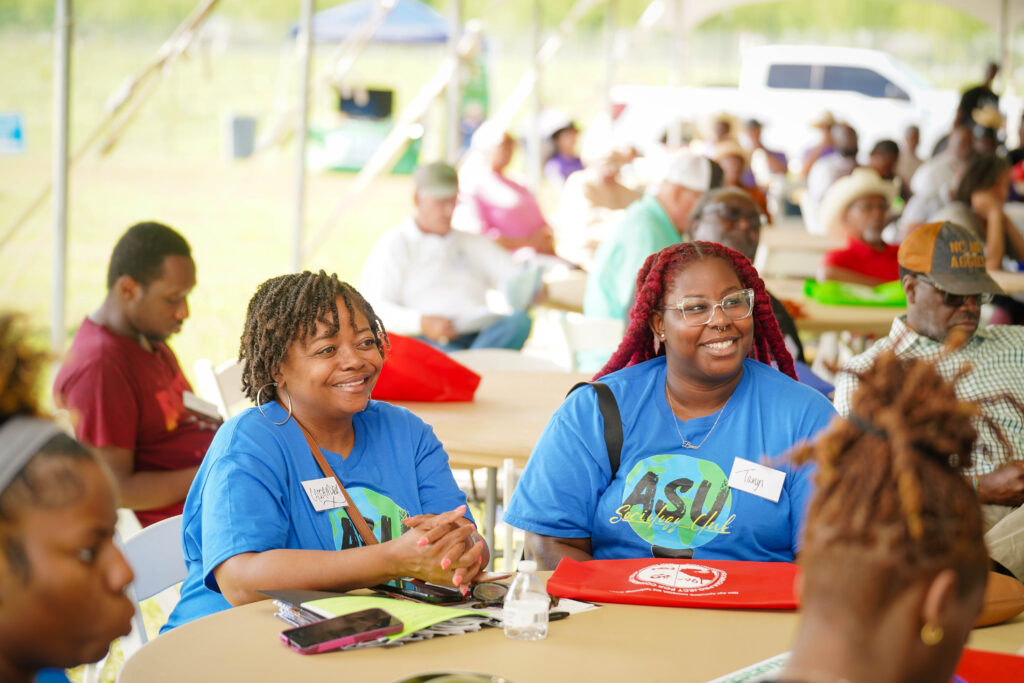
The Horse Experience That Reclaimed Her
Felicia’s work weaves Black agricultural legacy into a living, breathing, growing future. Five years ago, she met the Smith family of Greater Glory Equine in Albany. The encounter led her back to horseback. That seven-week riding course rekindled her girlhood bond with horses and deepened her sense of place in Georgia’s rural communities. “Felicia was such a treat to teach and now collaborate with,” says Jackie Smith, who runs Greater Glory Equine with her husband Garrick Smith and their four children Christiana, Isaiah, Joshua, and Naomi.
The five-acre family farm introduces urban families (specifically in underserved areas) to horsemanship. In the past five years, the Smiths have exposed approximately 3,100 youth and adults to horses in their area. The professional riders offer sensory sessions for families with special health care needs through ongoing programming. Because of the Southwest Georgia Project’s support, Felicia’s and the Smiths’ bond with the land and each other only strengthens. It’s more than just a partnership. It’s a shared purpose.
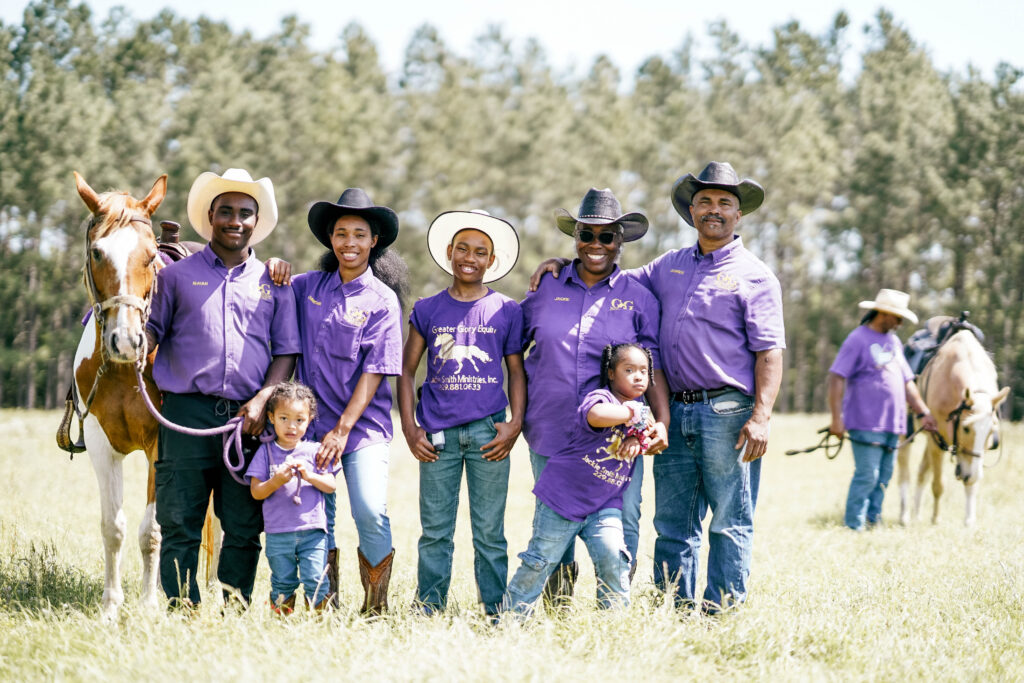
Cowhands and Cultural Connections
Felicia’s work echoes that of the Black cowhands who came before her. After the Civil War, nearly 25 percent of cowboys were Black. Many of them formerly enslaved. The term “cowboy” once diminished their skill, but women like Felicia are owning it with dignity. Today, she’s equal parts sustainability consultant and culture keeper. Her stories trade at field days, meetings, and beside irrigation lines. They become lessons for the next generation of land stewards. On April 23, nearly 300 cowhands, farmers, and aspiring young producers gathered at the Sherrods’ Resora property for the fifth annual Farm Field Day — held on land that once bore witness to some of the South’s darkest histories. Known historically as Cypress Pond Plantation, it was once owned by Hartwell Hill Tarver, one of Georgia’s wealthiest planters and largest slaveholders. After he died in 1851, a newspaper ad listed 150 enslaved Black people for sale, treated as property alongside the soil they tended.
Today, that same land — nearly 2,000 acres of pecan groves, cypress trees, and red clay resilience — has been reclaimed for Black land ownership. The antebellum mansion still stands. Now overlooking fellowship, not forced labor. On that spring day, attendees bonded while meandering between resource booths and stewardship tours, sharing food, knowledge, and freedom stories under a Southern sun. Earlier that same month, Felicia coordinated the project’s first-ever Conservation Field Day at Berry Family Farms in Ludowici. Around 200 attendees — from first-time growers to seasoned conservationists — gathered on that Black-owned beef cattle operation to exchange techniques, traditions, and dreams. Guided by experts from the U.S. Department of Agriculture and the University of Georgia, they mapped out a vision for what’s next. “It felt like a family reunion,” Felicia says, her eyes lit with memory. “We celebrated land, history, and new ideas.”
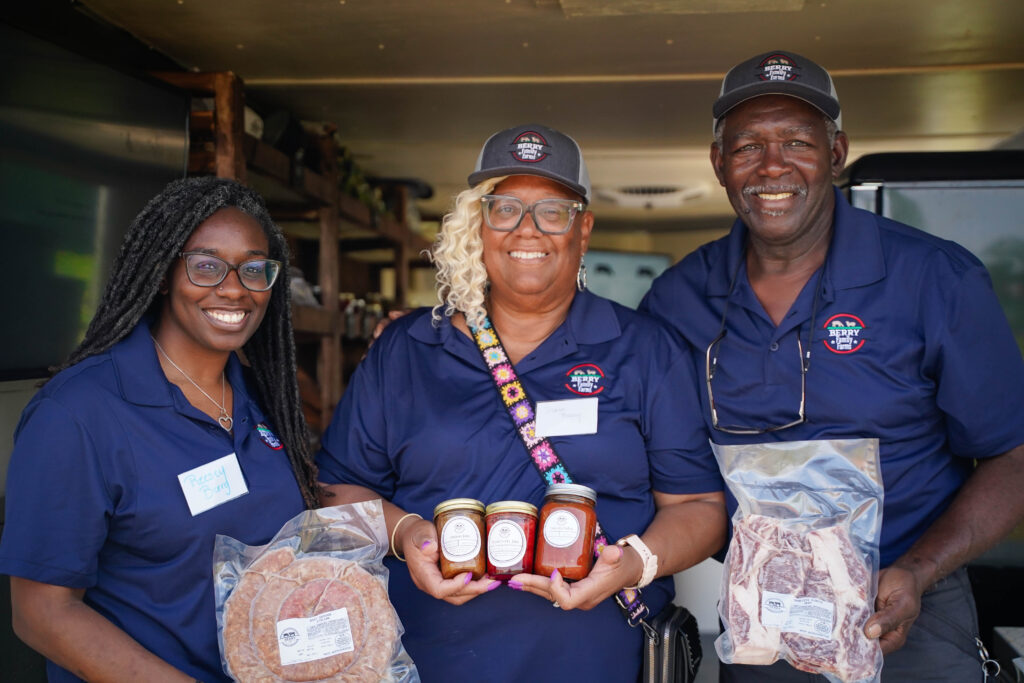
Forestry and Future of Black Farming Land
Two months prior, she turned her attention to trees and their connections to agricultural lifestyles. In partnership with the American Forest Foundation, she hosted an educational event focused on forestry and conservation easements — specifically for 25 Black landowners across Southwest Georgia who are emerging in this ownership space. “You wouldn’t believe how many of our property owners inquire about arborists, loggers, and tree removal specialists,” she tells me. “We need a rolodex of Black land professionals. For trust and cultural understanding.”
Each time I ride along, I see how Felicia’s journey is far more than a job. It’s ancestral work. It’s sisterhood. It’s soil and soul. Her F-150 will roll again soon as she heads to another farm. Another handshake. Another strategy session beneath Southern pines. And she’ll be there. Her hat tipped. Boots laced. Gathering the past and present to plant something better for us all.
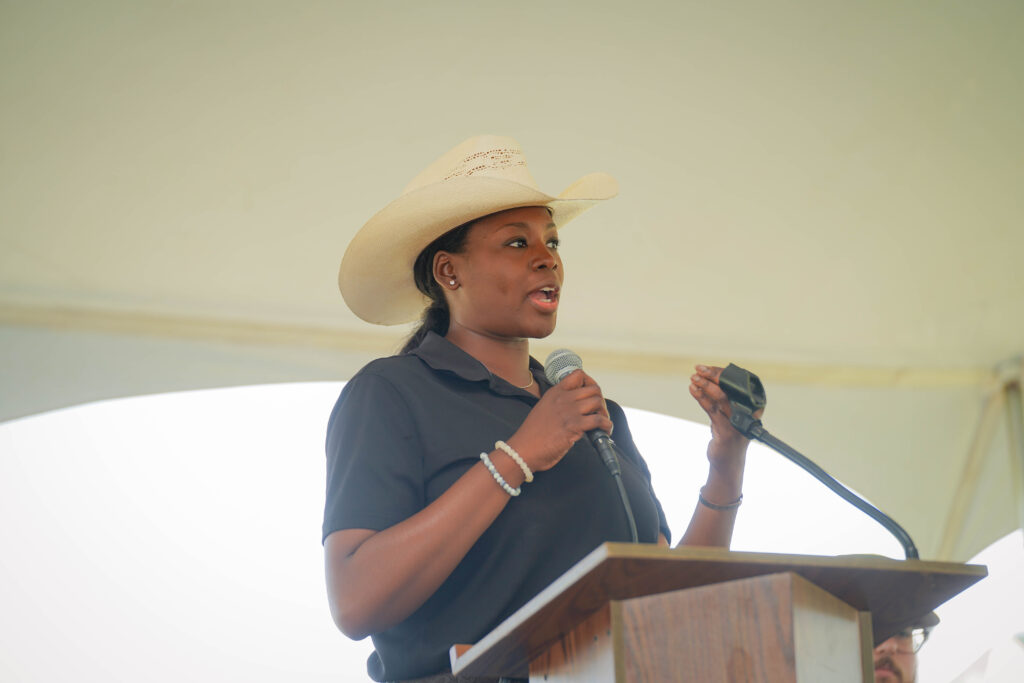
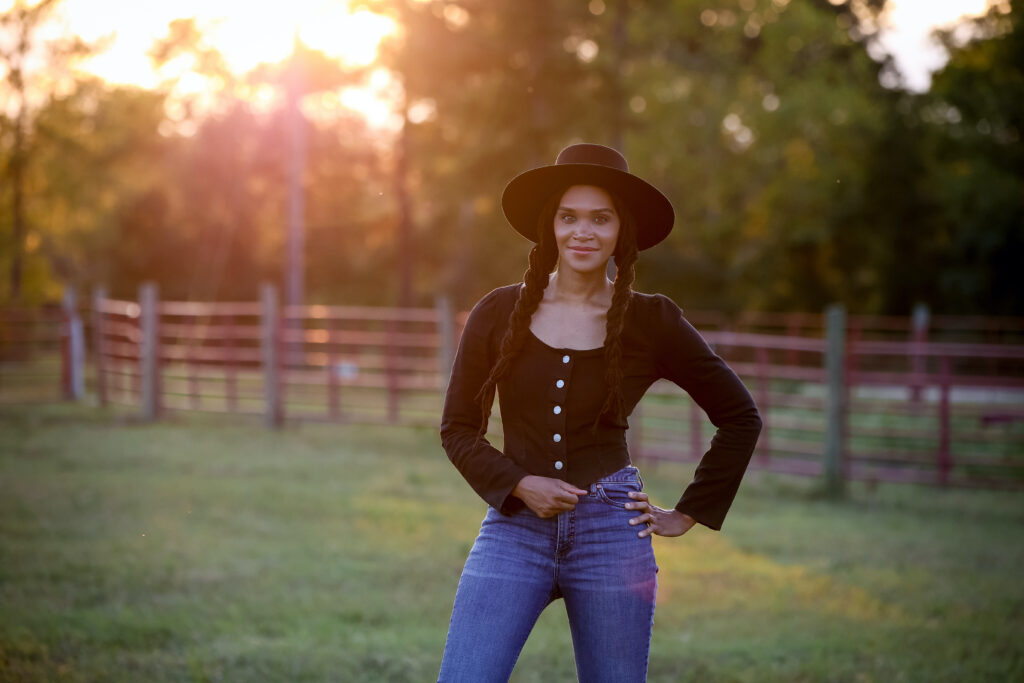
Candace Morrow, aka Cowgirl Candace, is a fourth-generation cowgirl, award-winning storyteller, and cultural strategist rooted in Georgia’s Black Belt Region. A lifelong farmer and advocate for Southern agritourism, she elevates place-based storytelling, capturing authentic voices of the American South. Her partnerships with iconic brands like Wrangler and Justin Boots amplify the often-overlooked narratives of American South heritage. With nearly two decades of experience in digital strategy and journalism, Cowgirl Candace has become a prominent steward of reimagining outdoor adventure and agricultural storytelling. Featured in Beyoncé’s “Cowboy Carter Tour Book” and Cowboys & Indians Magazine’s “21 Western Influencers,” she has demonstrated a profound commitment to documenting the nuanced experiences of rural communities.